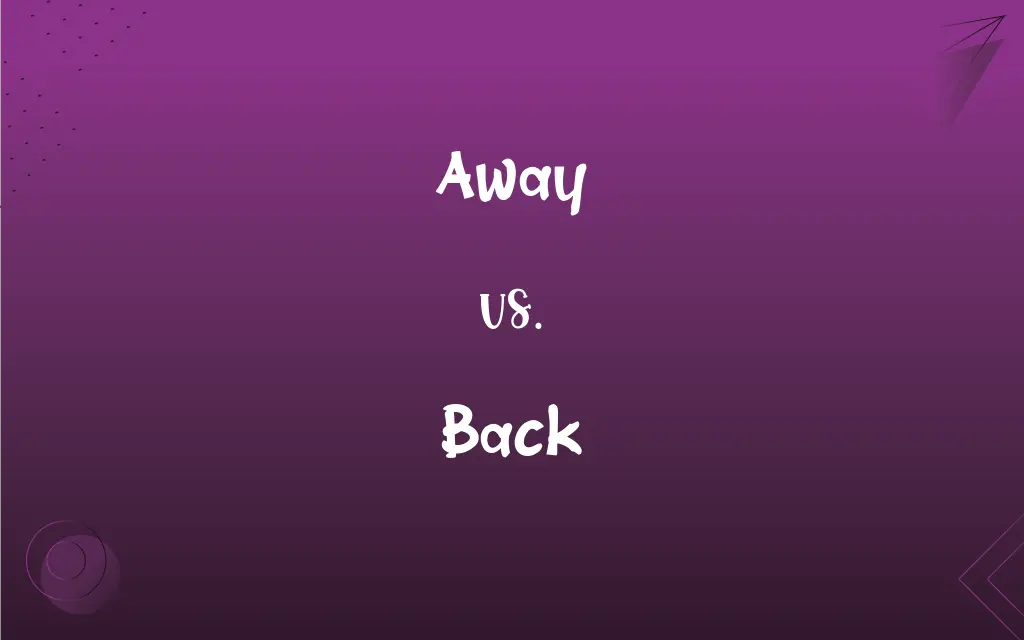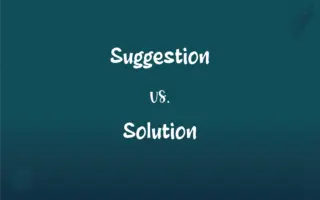Away vs. Back: What's the Difference?
Edited by Aimie Carlson || By Harlon Moss || Published on December 13, 2023
"Away" implies a movement or direction from a point of origin or current location, while "back" suggests a return to the original point or a reverse direction.

Key Differences
"Away" often denotes movement or direction that leads from a starting point or current position, suggesting distance or separation. In contrast, "back" indicates movement towards the origin or a previous position, often implying a return or reversal.
In usage, "away" can signify absence or removal, as in someone or something being not present or distant. On the other hand, "back" can suggest a regaining of position or status, indicating a return to a former state or place.
Contextually, "away" is used to express departure, such as leaving a place or situation. Conversely, "back" is often employed to express a return, whether it be to a location, a state of affairs, or a topic of discussion.
When it comes to temporal aspects, "away" can indicate a duration of being gone or apart, as in being away for a specific time. In contrast, "back" might be used to denote the completion of this period, as in coming back after a certain duration.
Comparison Chart
Direction
Movement or position away from a starting point
Return or movement towards the original point
ADVERTISEMENT
Connotation
Suggests leaving, departing, or distancing
Implies returning, reverting, or coming back
Temporal Usage
Used to indicate a period of absence
Used to mark the end of absence or a return
Contextual Use
Often denotes departure or removal
Typically signifies a return or reinstatement
Phrase Usage
Used in phrases like "moving away"
Used in phrases like "coming back"
Away and Back Definitions
Away
As a distance from a place.
The cat ran away from the dog.
ADVERTISEMENT
Back
As a support or rear surface.
He lay on his back.
Away
Indicating absence.
She is away on vacation.
Back
Indicating a return to a topic.
Let's get back to the subject.
Away
Used to express continuation.
The music played away into the night.
Back
Returning to an original place.
He went back home.
Away
As part of a phrasal verb.
She gave away her old clothes.
Back
Reversal of direction.
She looked back over her shoulder.
Away
Signifying removal or separation.
Keep hazardous materials away from children.
Back
Used in reference to the past.
Back in the 90s, things were different.
Away
From a particular thing or place
Ran away from the lion.
Sent the children away to boarding school.
Back
The part of the trunk of the human body along and to the sides of the spine between the neck and the pelvis; the dorsum.
Away
At or to a distance in space or time
We live a block away from the park.
Back
The analogous dorsal region in other animals.
FAQs
Can "away" imply permanence?
Yes, sometimes "away" can imply a permanent departure or distance.
What's the difference in use between "away" and "gone"?
"Away" often implies a temporary state, whereas "gone" can suggest permanence.
What does "away" mean in sports?
In sports, "away" refers to teams or games played at an opponent's venue.
Is "back" used in idioms?
Yes, "back" appears in idioms like "back to square one."
What is "away" in terms of distance?
It denotes being at a significant distance or separation.
Can "away" be used in commands?
Yes, as in "Go away!"
Can "back" be used to refer to the past?
Yes, "back" can refer to a time in the past, as in "back in the day."
How is "away" used in technology?
In technology, "away" often denotes an inactive or offline status, like "away mode."
Is "back" only used physically?
No, "back" can be used metaphorically, like returning to a topic or reverting to a previous state.
How does "away" function in a sentence?
"Away" can function as an adverb, describing the action or state of moving or being distant.
Can "back" be a noun?
Yes, "back" can be a noun referring to the rear part of something or someone.
Does "back" always mean physical return?
No, "back" can also mean a return to a condition or state, not just physical location.
Does "back" have a physical orientation?
Yes, it refers to the rear side of something.
Can "back" indicate support?
Yes, both physically and metaphorically, as in "I've got your back."
Can "away" describe emotional distance?
Yes, as in "feeling away from everything."
What does "back and forth" mean?
It means moving repeatedly in two opposite directions.
Is "back" used in technology?
Yes, like "back button" or "back end."
How does "away" relate to time?
It can indicate a duration of not being present.
How is "away" used in sports commentary?
To describe actions moving from a particular point, like "kicking the ball away."
Does "back" relate to history?
Yes, often referring to events or conditions in the past.
About Author
Written by
Harlon MossHarlon is a seasoned quality moderator and accomplished content writer for Difference Wiki. An alumnus of the prestigious University of California, he earned his degree in Computer Science. Leveraging his academic background, Harlon brings a meticulous and informed perspective to his work, ensuring content accuracy and excellence.
Edited by
Aimie CarlsonAimie Carlson, holding a master's degree in English literature, is a fervent English language enthusiast. She lends her writing talents to Difference Wiki, a prominent website that specializes in comparisons, offering readers insightful analyses that both captivate and inform.






































































